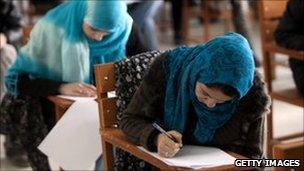Afghan Taliban 'end' opposition to educating girls
- Published

The Taliban are ready to drop their ban on schooling girls in Afghanistan, the country's education minister has said.
Farooq Wardak told the UK's Times Educational Supplement a "cultural change" meant the Taliban were "no more opposing girls' education".
The Taliban - who are fighting the Kabul government - have made no public comment on the issue.
Afghan women were not allowed to work or get an education under the Taliban regime overthrown in 2001.
Making deals
Mr Wardak made his comments during the Education World Forum in London.
He told the TES: "What I am hearing at the very upper policy level of the Taliban is that they are no more opposing education and also girls' education.
"I hope, Inshallah (God willing), soon there will be a peaceful negotiation, a meaningful negotiation with our own opposition and that will not compromise at all the basic human rights and basic principles which have been guiding us to provide quality and balanced education to our people," the minister added.
Across the country agreements have been struck at a local level between militants and village elders to allow girls and female teachers to return to schools, the BBC's Quentin Sommerville in Kabul reports.
Last October, Afghan President Hamid Karzai confirmed unofficial talks with Taliban leaders were under way in an attempt to end the bloody insurgency that has wrecked the troubled country for more close to a decade.
Mr Wardak's words suggest the negotiations have gone beyond issues like the release of prisoners to touch on areas of government policy, correspondents say.
However, the education minister admitted historical opposition to schooling extended beyond the Taliban to the "deepest pockets" of Afghan society.
"That is the reason that in many provinces of Afghanistan we do not have either male or female teacher," he said.
"During the Taliban era the percentage of girls of the one million students that we had was 0%. The percentage of female teachers was 0%. Today 38% of our students and 30% of our teachers are female."
Female MPs greeted with disbelief the Taliban's supposed softening of stance on schooling for girls.
Roshanak Wardak, a member of parliament from the central-eastern Afghan province of Wardak, told the BBC: "The Afghan government is saying that, but it's not true.
"I don't believe in this because in Wardak we have six Pashtun-dominated districts and all the girls' schools are closed and have never been open. There are only schools open in two Hazara-dominated districts."
Marman Gulhar, MP for the north-eastern province of Kunar, was also sceptical.
"This is not true and it will never happen," she told the BBC. "The Taliban will never be ready for that [girls' education].
"In fact they are fighting against that. The girls' schools are closed and still are closed."